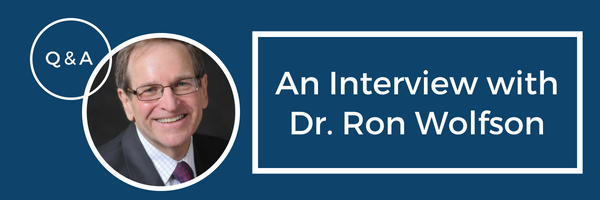
At Addicott Web, our focus is on helping Jewish non-profits, in particular synagogues, grow and the thrive in the digital age. Recently we sat down with Dr. Ron Wolfson, author of Relational Judaism: Using the Power of Relationships to Transform the Jewish Community (Jewish Lights Publishing) and co-author of the recently published The Relational Judaism Handbook: How to Create a Relational Engagement Campaign to Build and Deepen Relationships in Your Community (Center for Relational Judaism of the Kripke Institute) to discuss synagogue websites, the importance of storytelling and the downside to giving things away for free.
90% of American Jews say that they are proud to be Jewish, but only a small fraction choose to belong to a synagogue.
More and more people, particularly the upcoming generation who are digital natives, are likely to find a synagogue on the website first or check it out on the web before they walk in the door, so the attitude, the language, the visuals all send a message to those prospective members.
The website is literally the front door of the congregation.
I’m interested in this relational engagement work and building relationships on three tiers. The first tier is helping people engage with the Jewish experience. That might mean a website linking people to great resources on how to “do Jewish.”
The second tier is building a relationship with the clergy and staff of the synagogue. I often see bios of the clergy and staff on websites, along with an invitation to engage. Most of them will list an email; some of the more adventurous websites will have a way to actually calendar a meeting directly the Rabbi.
And then the third tier, which is the most interesting to me: is how do you connect people who are already members of the community with each other?
Most synagogue websites are rather stodgy. I would like to see a much “hipper” presentation of what a synagogue community can be, especially if you want to reach out to a younger population who are looking for a school for their kids or looking for someplace where they can be Jewish. A welcoming website that is fun, even tongue-in-cheek a bit, would stand out.
I’d like to see more opportunities for congregants to connect with the staff and the clergy.
Not just access the Rabbi’s blog and sermons, but invitations from the Rabbi to engage -either by email or by coming in to visit.
I’d also like to see more stories of the people of the community and what they are doing and what they are thinking and how they got there. Stories of what their community has meant to them.
If I am looking for a spiritual home, I would want to know “who are the people of this community? Why would I want to meet them? Why would I want to engage with them? And, is this a place where I can find friends?”
One of the key strategies in relational engagement is to encourage people to tell their stories. That is something that you can do well on a website. And not just testimonials. I don’t need a Yelp-type testimonial that this synagogue has the greatest Rabbi.
It would be great to see a page that constantly changes with the personal stories of their spiritual journeys.
The Jewish Emergent Network spiritual communities are on the cutting edge. There are seven places: The Kitchen in San Francisco, the Kavana Cooperative in Seattle, IKAR in Los Angeles, Mishkan in Chicago, Sixth and I in Washington DC and two communities in New York City – Romemu and Lab Shul. Those guys get it.
A lot of people don’t like it. I was just at the JEN national conference and they tried to avoid the word “Member.” Some people use the word “partner” or “community” over and over again. Even “synagogue” is replaced by “spiritual community. For most synagogues in the country, they are still making this distinction between “member” or “guest” and it feels like you’re in or you’re out. I don’t know what the answer is. We need a whole new language for this and I don’t think we’ve invented it yet.
Rabbi Noa Kushner started The Kitchen out of our Synagogue 3000 project. It began as a parallel group to a Reform congregation, Rodef Sholom in Marin County, and then migrated to downtown San Francisco. Noa has experimented with the subscription model. Her idea was some people want a “full” subscription; they want everything that the community has to offer. Some people just want to subscribe to High Holiday seats. Noa pegged the monetary contribution to how deep they want to go, how many offers they want to pick up in their subscription.
Well, it’s not just what you “get” – it’s what we expect of you. The message to the community of prospective people is – not only do you get stuff, but we expect you to give stuff. And not just money.
If you look at IKAR’s website, money is the last thing they list. The first ask is: “We are a small group, we are a small staff, so we need your help. We expect you as a member of our community to be a participant in our community.” The second ask is: “We are a learning community, so expect everyone to learn. Not just kids.” The third notes: “We are a community that is a nexus of social justice and spiritually, so we expect everybody to participate in our Minyan Tzedek social justice work.” And then the fourth ask is: “Community has costs, so we expect a financial commitment.”
I like that because there is a downside to a lot of things in the Jewish community being free. The message is we are going to give, give, give and we don’t expect much back.
In a true relational community, you are deeply invested in the people of the community and in the success of the community and in the work of the community and that means you put yourself forward for the community. It’s an important message for people to hear through a web presence.
I’ve been visiting and studying mega-churches for more than twenty years and it’s instructive to visit their websites. I’ve become good friends with Rick Warren, the pastor of Saddleback Church in Orange County. California. He likes to ask: “What’s the first question people ask when they walk into a church for the first time?” It’s not “Where’s the bathroom?” It’s: “Is there anybody here who I can be friends with, who is in the same stage of life?”
That’s a great lesson for synagogues and their websites. The photos on your website need to represent the people who you want to attract. You’ve got to make sure that it’s not just older folks or just kids, but it’s people of all ages doing cool stuff together. And no photos of empty sanctuaries, please!
I always say that If there are 1,000 people showing up for a religious service – I want to know what’s going on. And it’s the same with websites.
If IKAR and other places have created the sweet spot of attractive, clever, and engaging websites, take a look at it, deduce the principles of what makes it work, and then create your own engaging, relational “front door” to your community.
 Dr. Ron Wolfson is Fingerhut Professor of Education, American Jewish University. He can be reached at and Relational Judaism Handbook.
Dr. Ron Wolfson is Fingerhut Professor of Education, American Jewish University. He can be reached at and Relational Judaism Handbook.
We specialize in designing professional and modern websites that are as vibrant as your congregation. Together, let’s make your community thrive online.
We are here to answer any questions you may have about Addicott Web, our services, or how we can design and build a new website for your synagogue.
"*" indicates required fields